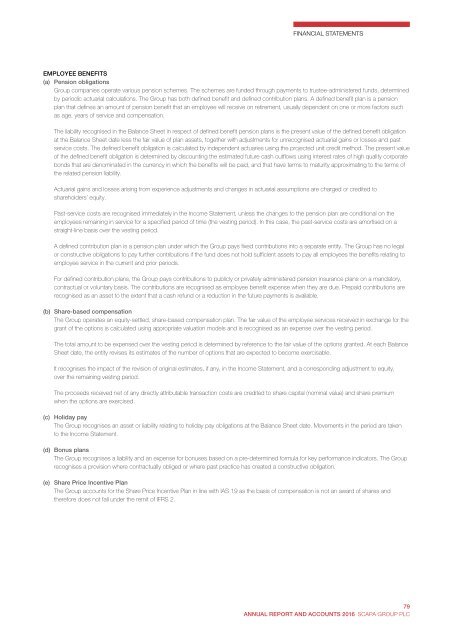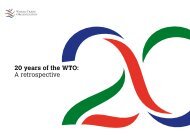20645_Scapa_AR_160504
Create successful ePaper yourself
Turn your PDF publications into a flip-book with our unique Google optimized e-Paper software.
GROUP ACCOUNTING POLICIES CONTINUED<br />
FINANCIAL STATEMENTS<br />
EMPLOYEE BENEFITS<br />
(a) Pension obligations<br />
Group companies operate various pension schemes. The schemes are funded through payments to trustee-administered funds, determined<br />
by periodic actuarial calculations. The Group has both defined benefit and defined contribution plans. A defined benefit plan is a pension<br />
plan that defines an amount of pension benefit that an employee will receive on retirement, usually dependent on one or more factors such<br />
as age, years of service and compensation.<br />
The liability recognised in the Balance Sheet in respect of defined benefit pension plans is the present value of the defined benefit obligation<br />
at the Balance Sheet date less the fair value of plan assets, together with adjustments for unrecognised actuarial gains or losses and past<br />
service costs. The defined benefit obligation is calculated by independent actuaries using the projected unit credit method. The present value<br />
of the defined benefit obligation is determined by discounting the estimated future cash outflows using interest rates of high quality corporate<br />
bonds that are denominated in the currency in which the benefits will be paid, and that have terms to maturity approximating to the terms of<br />
the related pension liability.<br />
Actuarial gains and losses arising from experience adjustments and changes in actuarial assumptions are charged or credited to<br />
shareholders’ equity.<br />
Past-service costs are recognised immediately in the Income Statement, unless the changes to the pension plan are conditional on the<br />
employees remaining in service for a specified period of time (the vesting period). In this case, the past-service costs are amortised on a<br />
straight-line basis over the vesting period.<br />
A defined contribution plan is a pension plan under which the Group pays fixed contributions into a separate entity. The Group has no legal<br />
or constructive obligations to pay further contributions if the fund does not hold sufficient assets to pay all employees the benefits relating to<br />
employee service in the current and prior periods.<br />
For defined contribution plans, the Group pays contributions to publicly or privately administered pension insurance plans on a mandatory,<br />
contractual or voluntary basis. The contributions are recognised as employee benefit expense when they are due. Prepaid contributions are<br />
recognised as an asset to the extent that a cash refund or a reduction in the future payments is available.<br />
(b) Share-based compensation<br />
The Group operates an equity-settled, share-based compensation plan. The fair value of the employee services received in exchange for the<br />
grant of the options is calculated using appropriate valuation models and is recognised as an expense over the vesting period.<br />
The total amount to be expensed over the vesting period is determined by reference to the fair value of the options granted. At each Balance<br />
Sheet date, the entity revises its estimates of the number of options that are expected to become exercisable.<br />
It recognises the impact of the revision of original estimates, if any, in the Income Statement, and a corresponding adjustment to equity,<br />
over the remaining vesting period.<br />
The proceeds received net of any directly attributable transaction costs are credited to share capital (nominal value) and share premium<br />
when the options are exercised.<br />
(c) Holiday pay<br />
The Group recognises an asset or liability relating to holiday pay obligations at the Balance Sheet date. Movements in the period are taken<br />
to the Income Statement.<br />
(d) Bonus plans<br />
The Group recognises a liability and an expense for bonuses based on a pre-determined formula for key performance indicators. The Group<br />
recognises a provision where contractually obliged or where past practice has created a constructive obligation.<br />
(e) Share Price Incentive Plan<br />
The Group accounts for the Share Price Incentive Plan in line with IAS 19 as the basis of compensation is not an award of shares and<br />
therefore does not fall under the remit of IFRS 2.<br />
74<br />
<strong>Scapa</strong> Group plc Annual Report and Accounts 2016<br />
79<br />
ANNUAL REPORT AND ACCOUNTS 2016 SCAPA GROUP PLC
















